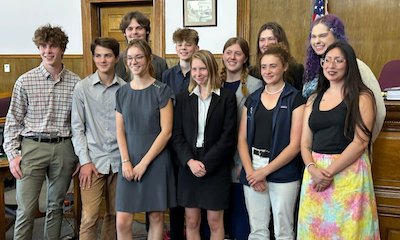|
Young Plaintiffs Win Climate Change Case against Their State
August 16, 2023
For the first time in American history, a court has said that a government is constitutionally bound to protect its citizens from climate change. That was the ruling of Montana District Judge Kathy Seeley in Held v. Montana, a closely watched case brought by 16 young plaintiffs. In particular, the ruling found that part of the state's Environmental Policy Act was in contravention to the state constitution and specifically to what is known as the state's "Green Amendment," which guarantees Montana citizens a "clean and healthful" climate. The act promoted the continued use of fossil fuels, which have been found to lead to global warming and went further, preventing Montana from taking into considering how such energy projects affected the state climate; it was that prevention that the judge found unconstitutional. The plaintiffs produced an abundance of evidence supporting the connection between the production of fossil fuels and a global rise in temperature, greenhouse gas emissions, and carbon dioxide levels. The defense had argued that even if the state did stop producing fossil fuels, the effect would be negligible because of what other states and countries are still doing; the judge firmly disagreed, ordering an immediate voiding of the climate change consideration prevention. The lawsuit came in 2020, when the plaintiffs ranged in age from 5 to 22. Named defendants were Montana then-Gov. Steve Bullock, the state Department of Environmental quality, the state public commission office, and a handful of other state departments. The trial began in June 2023 and lasted two weeks. The chief legal counsel was Julia Olson, who is also executive director of Our Children's Trust, an Oregon environmental group that has filed similar lawsuits in all 50 states since 2011. The Montana lawsuit was the first one to make it to trial. The decision, handed down by a state judge, applies only within Montana. A handful of other states–including Hawaii, Massachusetts, New York, and Pennsylvania–have similar language in their state constitutions. Observers expected similar lawsuits in other states after the ruling, which the state's attorney general, Austin Knudsen, promised to appeal. In 1972, Montana called a constitutional convention and amended the state constitution; Montana voters then approved the changes in a referendum. Article II.3 of the Montana Constitution reads thus: "All persons are born free and have certain inalienable rights. They include the right to a clean and healthful environment and the rights of pursuing life’s basic necessities, enjoying and defending their lives and liberties, acquiring, possessing and protecting property, and seeking their safety, health and happiness in all lawful ways. In enjoying these rights, all persons recognize corresponding responsibilities."
|
Social Studies for Kids |
Social Studies for Kids
copyright 2002–2024
David White





